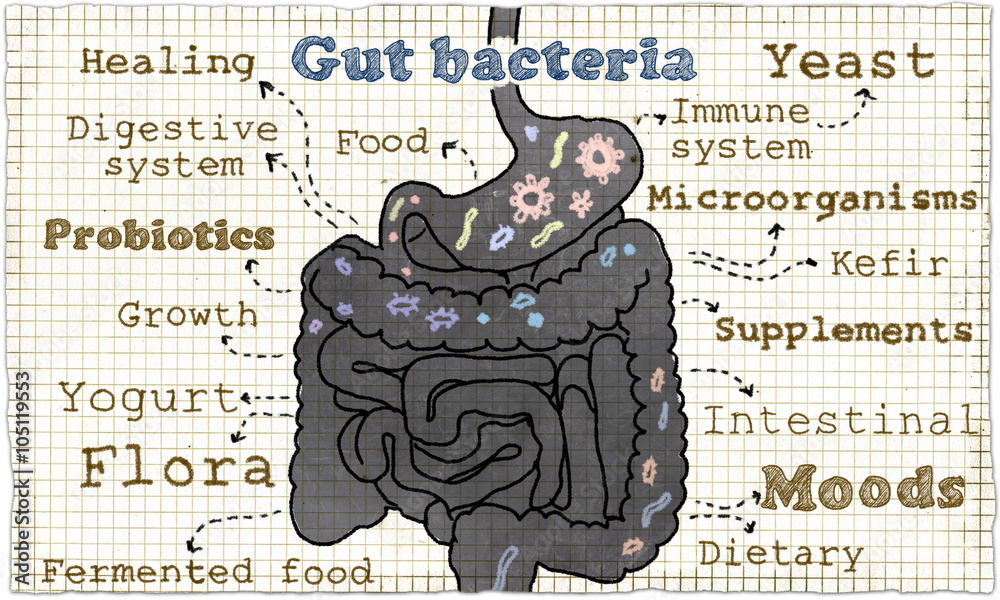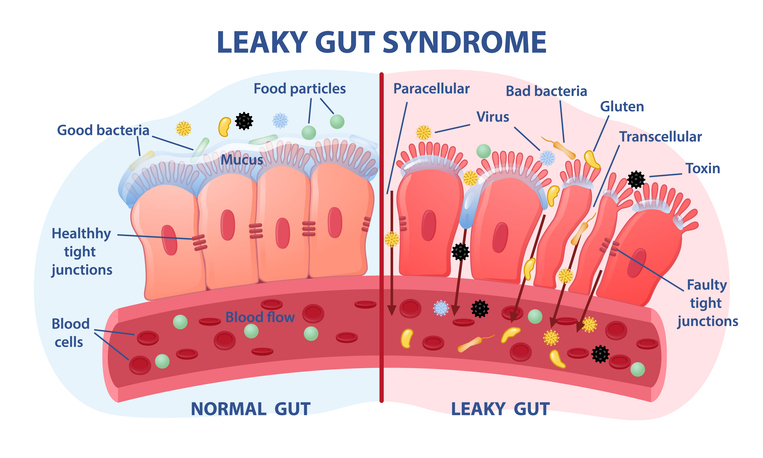With so much conflicting information available, you may have questions with where to even begin. In our Foundations series, we start with the basics and cover topics that are important to your health and wellness. We give you easy to digest information that answers your questions and hopefully leaves you wanting to know more! Today we explore Leaky Gut syndrome. Sounds bad right? What is it? Why is it bad? How do we get rid of it?
Apologies in advance – this is a bit of a long one.

What is Leaky Gut?
Leaky Gut is not a medical diagnosis; it describes more and larger particles getting through the barrier. Discussion around increased intestinal permeability (Leaky Gut) and the effects on the body has been in medical journals for over 60 years. Yet we are only at the tip of the iceberg in discovering what this means to the body. Thanks to recent advances in technology such as DNA sequencing, we see correlations between the microbiome and disease.
Scientific evidence shows strong relationships to autoimmune and inflammatory conditions. Conditions such as inflammatory bowel disease (IBD), Crohns disease, asthma, anxiety and rheumatoid arthritis for example occur along side leaky gut – and what’s more, a focus on healing the gut and improving the microbiome (the balance and types of bacteria in your gut), improves the symptoms of these diseases.
Why is Leaky Gut bad?
Let’s back up a bit and look at the intestines and how they are supposed to function. To start, the intestines are supposed to be a little leaky. This is how the nutrients from the food we eat get into our bloodstream and throughout our body. Chewing, digestive enzymes from our mouth and pancreas and bile from our gallbladder, the food we eat is broken down into small, usable parts: sugars, proteins and fats. Once the food reaches the intestines, these nutrients get absorbed through tiny finger-like projections called villi. In exchange, waste products from the blood along with water are excreted forming stool. If there was no permeability, there would be no exchange of these nutrients and waste.

The problem then lies in when the barrier becomes overly permeable. The normally “tight junctions” between the cells can become damaged by both environmental damage or inherited (DNA) conditions. This damage causes the barrier to become leaky, allowing larger bits of food, toxins or bacteria to move through. In an attempt to protect itself, your body sends out an army of immune cells to attack the “invaders”, leading to inflammation and damaging changes to the microbiome. Additionally, the body makes antibodies of these foreign invaders to more quickly recognize and destroy them in the future. Unfortunately, this hyperactive response can lead to an autoimmune response where our immune system begins to attack our own similar looking cells, leading to conditions like Lupus, rheumatoid arthritis and diabetes and more.
What are some causes of Leaky Gut?
Unfortunately, one of the top contenders in causing leaky gut syndrome is the Standard American Diet (SAD). The SAD diet is one that is familiar to many of us…heavy in processed foods, added sugars, red meat and refined carbohydrates. And lacking in high fiber foods, fruits and vegetables. This dietary imbalance leads to a decrease in the number and different types of bacteria that reside in our gut – collectively called the microbiota or microbiome.
What about some other factors that can lead to Leaky Gut?
- Standard American Diet: This is worth saying twice! Processed foods that are readily available in a Western diet, can wreck havoc on the bacteria in the gut. We also tend to have low intake of fruits and vegetables which provide new and diverse bacteria as well as a wide range of phytonutrients. Dairy and gluten are known to cause sensitivity in many people, even if there is not an outright allergy. This is likely due to a disruption in the gut lining and often resolves once the ingredient is removed.
- Acid reducing medications: This one is a little counter intuitive. If you have heartburn or acid reflux, you should use acid reducing medications right? Well, not exactly. A dangerous side effect is that these medications can actually INCREASE the number of bad bacteria in the intestines leading to Small Intestine Bacterial Overgrowth (SIBO). Acid reducers are also known to change the immune system response which can mean your body may not be able to fight off these extra bacteria (or it may fight too hard, contributing to autoimmune disorders).
- Antibiotics: While antibiotics can be lifesaving, they are also indiscriminate. As they are fighting to attack the bad bacteria in your body, the good guys are killed as well. Aside from ever growing resistance to antibiotics, GI side effects like nausea and diarrhea are common with use.
- Toxin exposure: Regular exposure to toxins in our food and water can lead to a breakdown of the gut wall. Consuming alcohol on a regular basis can cause significant irritation and breakdown of the intestinal wall. Glyphosate (Round-up) is a commonly used pesticide that is used in non-organic produce and is linked to a leaky gut, among other health concerns. It is estimated that over 80% of the US population has had recent exposure.
How do I get rid of it?
Managing Leaky Gut is two fold. First, removing the triggering agent is critical. This may take a little digging to figure out where the root of the issue is, and can be done with the assistance of your functional medicine provider. Then, you have to work on healing the gut and allowing those tight junctions to properly form again.
- Probiotics: Strains of Lactobacillus and Bifidobacterium are associated with improved immunity and are helpful in gut restoration. Ensuring a high quality brand is essential and can be purchased through companies like Fullscript who vet the manufacturer before selling their product. Probiotics in the form of kefir, yogurt or kombucha are also helpful, just be sure to avoid too much added sugar!
- Eat the Rainbow: Ensuring that you get a little something from each color group every day will help increase your good bacteria and the amount of nutrients you are giving your body.
- Anti-inflammatory foods: Ingredients such as fish and nuts are a great way to get your good fats, the Omega 3s into your body.
- Rest and less stress: This may seem impossible at times, but it is during the resting period that your body best recovers. Additionally, both lack of sleep and high levels of stress have been shown to damage the cell’s intestinal barrier. Aim for at least 7 hours of sleep each night. Stress reduction techniques like deep breathing, gentle movement and meditation help keep your nervous system in balance and improves your overall health and wellbeing.
To learn more about Functional Medicine and see how it may help you, schedule a free 15 minute consultation or head to our Work With Me page! Don’t forget to sign up for our newsletter below as we delve into topics like lifestyle medicine, ingredient highlights, medication concerns and more.
Anytime that you are experiencing a health concern, please contact a healthcare professional for guidance. In the meantime, ensuring that you are providing your body with the nutrients it needs and supporting it through sleep and stress reduction will always provide benefit. The content on this site is for informational or educational purposes only and does not substitute professional medical advice or consultations with healthcare professionals.
References:
- https://www.worldgastroenterology.org/UserFiles/file/guidelines/probiotics-and-prebiotics-english-2023.pdf
- https://aacijournal.biomedcentral.com/articles/10.1186/s13223-022-00753-4
- https://www.arthritis.org/health-wellness/healthy-living/nutrition/healthy-eating/probiotics-and-arthritis
- https://my.clevelandclinic.org/health/diseases/22724-leaky-gut-syndrome
- https://www.arthritis.org/health-wellness/healthy-living/nutrition/healthy-eating/probiotics-and-arthritis
- https://www.ncbi.nlm.nih.gov/pmc/articles/PMC10159235/
- https://www.psychologytoday.com/us/blog/the-resilient-brain/202307/exploring-the-link-between-the-gut-microbiome-and-anxiety
